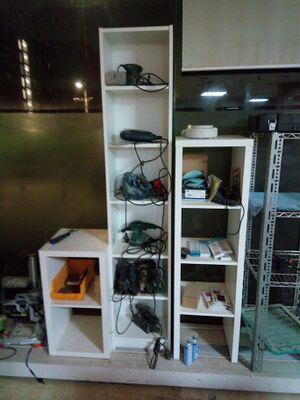Handheld Woodworking Power Tools
The space owns a variety of handheld woodworking machines. Since they tend to wear out and be replaced more often than many of their larger bench tool cousins we do not list them all separately on the wiki. Most are free of any training requirement and are kept on shelves around the woodshop, but some more delicate or expensive items are stored in the wood tools cupboard and should only be used by those who have been approved to use these tools.
A quick survey of the woodshop in Jan 2022 found that at least one of all the following tools were available:
- Milwaukee cordless drill
- Milwaukee impact driver
- Various Hitachi and Ryobi drills and drivers (quite worn out compared to the Milwaukee, mostly used as spares and when the others are in use)
- Random orbit sander
- Belt sander
- 1/4 sheet orbital sander
- 1/2 sheet orbital sander
- Mini belt sander/ power file
- Jigsaw
- Circular saw
- Power planer
- Palm router
- 1/4" plunge router
Risk Assessment - Template
This risk assessment is intended to provide guidance on the risk associated with the above equipment and activities in normal use. Please also check general risk assessments for the space as a whole. Any discrepancies, errors or concerns should be raised with the document maintainers or trustees - do not edit this assessment directly. For responsible persons and last update, see 'version log' of the assessment page.
Activity
Use of generic handheld power tools such as drills, drivers, circular saws, jig-saws, sanders, oscillating multi-tools
Signage
Understanding Risk Rating
LOW - Ensure current control measures are in place and continue with activity
MED - Control measures may be adequate, co-supervision is recommended
HIGH - Do not undertake activity without further consultation with area specialists
Risk Assessment
| Identify Hazards | Who May be Harmed and How | Severity | Control Measures | Likelihood | Risk Rating |
|---|---|---|---|---|---|
| Incompetent user | User, Bystander | HIGH | Users must not use tools that they are not competent to use. Members must challenge use that they believe is dangerous. Users must read the user manual where applicable Users must read the risk assessment before using a tool | LOW | MED |
| Contact with bit, drill, blade, or disc | User – serious harm | HIGH | Guards must not be removed and must be used where they are provided on the tool. Ensure all loose clothing and long hair are tied back to prevent contact with the tool. Do not place excessive pressure on the tool to achieve a hole or cut. Do not put hands into exclusion zone (within 10cm of cutting or drilling area). Do not leave tool running when not in use Switch tool off immediately after use | LOW | MED |
| Drawing in (being pulled into the belt sander, grinder, or circular saw) | User of the tool – serious harm | HIGH | Ensure all loose clothing and long hair are tied back to prevent contact with the tool. Do not put hands into exclusion zone (within 10cm of the cutting area). | LOW | MED |
| Dust (inhalation, fire, explosion) | User of the tool, users of the room, the space – breathing difficulties/irritation | MED | The tool must be used with the dust extractor attached and working, where a connection is provided on the tool. Maintenance must include the cleaning of dust from within the tool housing. A respirator or mask should be used whilst cutting or sanding | LOW | LOW |
| Ejection of workpiece (Kickback from saws and grinder) | User of the tool, users of the room, the space. – serious harm | HIGH | Do not stand in the path of moving material Ensure the workpiece is clamped to a surface or a vice (except for the plunge saw) | LOW | MED |
| Noise | User of the tool, users of the room. | MED | Ear protection is advised. | LOW | LOW |
| Flying splinters | User of the tool, users of the room. – Eye injury | MED | Eye protection must be worn in the room | LOW | LOW |









